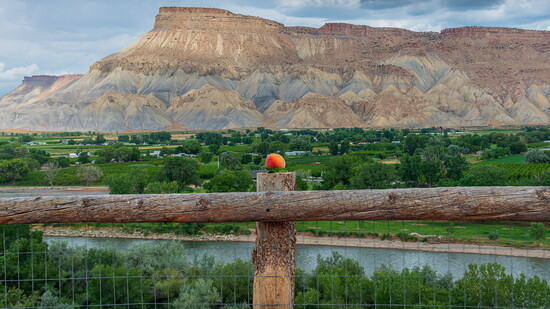Western Colorado, with its diverse landscapes and favorable climate, serves as a thriving hub for agricultural production and community events celebrating local products. The region's varied elevations, rich alluvial soils, and ample sunshine create ideal conditions for cultivating a range of high-quality products that support both local economies and distant markets.
Fruit Production
One of Western Colorado's most celebrated agricultural outputs is its fruit, particularly peaches from the Grand Valley. The unique combination of hot days and cool nights enhances the sweetness and flavor of these peaches, making them highly sought after. Palisade, is renowned for its luscious, sun-ripened peaches, drawing thousands of visitors during the annual Peach Festival. In addition to peaches, the region is known for producing apples, cherries, apricots, and plums, with orchards stretching across Mesa and Delta counties.
Viticulture and Wineries
Western Colorado has also carved out a niche in viticulture, thanks to its arid climate and well-drained soils. The Grand Valley and West Elks American Viticultural Areas (AVAs) host numerous wineries and vineyards producing award-winning wines. Varietals like Cabernet Sauvignon, Merlot, Riesling, and Syrah thrive here, benefiting from the region’s elevation and temperature swings, which enhance grape complexity.
Vegetable and Row Crops
Beyond fruit and wine, Western Colorado supports a wide variety of vegetable farming. Sweet corn from Olathe is particularly famous, celebrated annually at the Olathe Sweet Corn Festival. The region also grows tomatoes, onions, melons, and leafy greens, often sold at local farmers' markets and distributed to regional grocers. Organic farming practices are increasingly popular, with many farms embracing sustainable techniques to meet growing consumer demand.
Livestock and Dairy
Livestock production plays a significant role in Western Colorado's agricultural landscape. Cattle ranching is predominant, with beef being a major product. Sheep herding is also common, contributing to both meat and wool production. Dairy farms, though fewer in number, produce milk, cheese, and yogurt for local consumption and distribution.
Grains and Forage
The region’s drier areas support the cultivation of grains like wheat, barley, and oats. Barley, in particular, finds a ready market with local craft breweries, which have flourished alongside the burgeoning wine industry. Additionally, alfalfa and other forage crops are vital for sustaining the livestock industry, providing high-quality feed throughout the year and top quality, weed free hay prized by outfitters guiding adventurers and hunters alike in the western Colorado's high country.
Emerging Agricultural Trends
In recent years, Western Colorado has seen growth in hemp cultivation, driven by the demand for CBD products. Greenhouse operations are also expanding, enabling year-round production of herbs, salad greens, and specialty crops.
Western Colorado’s agricultural diversity not only sustains its economy but also enhances its cultural identity, reflecting a rich heritage of farming, ranching, and innovation.
Some festivals and area names still celebrate historic production that is no longer active.
Redlands - known for the fiery, fruit blossoms of Spring. Appleton - not so apple-ey these days.
Strawberry days in Glenwood Springs, Potato Days - Carbondale.
